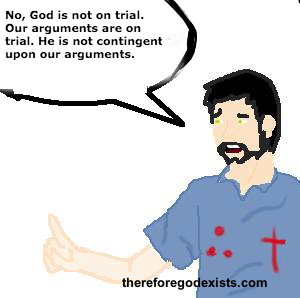 As Christians, our marching orders are found in Matthew 28:19. We are commanded to go into every nation, preaching the gospel and baptizing converts. God has commissioned his people to relay his plan of salvation to the world. However, there is a divide among Christians about the best way that one can accomplish this task. God has ordained that some people would respond to the gospel via different methods. Some respond to the love of the church. Some respond to evidence. But as we discuss the evidence, it becomes clear that these arguments are probabilistic and uncertain. This leads many to object that we are preaching about a God who probably exists, who might save, and that it is all uncertain. Is that the case? Do classical apologetics postulate a probabilistic God?
As Christians, our marching orders are found in Matthew 28:19. We are commanded to go into every nation, preaching the gospel and baptizing converts. God has commissioned his people to relay his plan of salvation to the world. However, there is a divide among Christians about the best way that one can accomplish this task. God has ordained that some people would respond to the gospel via different methods. Some respond to the love of the church. Some respond to evidence. But as we discuss the evidence, it becomes clear that these arguments are probabilistic and uncertain. This leads many to object that we are preaching about a God who probably exists, who might save, and that it is all uncertain. Is that the case? Do classical apologetics postulate a probabilistic God?
 This objection is primarily raised by disciples of Dr. Cornelius Van Till, after whom this breed of apologetics (also known as presuppositional apologetics) has been named. They believe that the proper and exclusive mode of Christian apologetics is to point out that even non-believers assume the existence of God and the truth of Christian theology. Since they focus so much on how atheists “know” what is true (the study of epistemology), the flaw that they see in classical apologetics is similar. How do classical apologists “know” what is true? They do not truly know, do they? After all, all of the arguments for classical apologetics are probabilistic and uncertain. Do classical apologetics postulate a probabilistic God?
This objection is primarily raised by disciples of Dr. Cornelius Van Till, after whom this breed of apologetics (also known as presuppositional apologetics) has been named. They believe that the proper and exclusive mode of Christian apologetics is to point out that even non-believers assume the existence of God and the truth of Christian theology. Since they focus so much on how atheists “know” what is true (the study of epistemology), the flaw that they see in classical apologetics is similar. How do classical apologists “know” what is true? They do not truly know, do they? After all, all of the arguments for classical apologetics are probabilistic and uncertain. Do classical apologetics postulate a probabilistic God?
Is God On Trial?
Sometimes when Christians do apologetics, they will use the illustration of the courtroom. This is evident in the 2014 film, God’s Not Dead. The main character is tasked with presenting evidence for the existence of God before his 101 philosophy class. During his prologue, he said something like, “God is on trial. I am the defense attorney. The professor is the prosecutor. You are the jury.” Then, he proceeded to present his arguments. This imagery is disturbing and has invoked no small critique from presuppositional apologists. They point out that the non-believer does not get to stand in judgment over God. They do not get to decide whether God exists. God judges them and holds them accountable for their non-belief.
That is why I reject this imagery. I reject the illustration of the courtroom. The classical apologist is not maintaining that God is on trial and that the non-believer gets to judge him. God exists independently of our arguments. Our arguments are on trial. God is not. These arguments did not fall down from Heaven. You are free to disagree with them if you think they are unsound. When these arguments reach the conclusion, “Therefore, God exists,” they are probabilistic conclusions. But the existence of God is not linked with the conclusion. God exists even if the argument fails. Do classical apologetics postulate a probabilistic God? No, it is the evidence that is probabilistic.
Can Other Traditions Use The Same Arguments?
Muslims will sometimes use similar arguments to prove that God exists. They may tie it in with arguments related to the Qur’an or the prophethood of Muhammad. Presuppositional apologists may sometimes see this as a demerit of wielding the evidence for the existence of God. After all, if we convince somebody to convert from atheism is deism, they still do not believe the gospel. They are still unsaved and unconverted.
This is a worthy point that every classical apologist needs to consider. It is not enough to just speak to an unbeliever about the evidence. They need to hear the gospel. But that is not to say that we cannot use evidence. Sometimes, there are intellectual barriers that may prevent a person from coming to believe. God may sovereignly draw somebody into regeneration and saving faith when those intellectual barriers are removed. There is no harm in discussing the evidence. After all, as Christians, we are committed to the truth that God created the Heavens and the earth.
Do classical apologetics postulate a probabilistic God? I should not think so. While we have evidence that God is the Creator, that does not mean that he is only the Creator. He has other roles, such as Savior. It is insufficient to exclusively discuss the evidence, as other religious traditions could use the same evidence. But that should not prevent us from exploring that option, so long as the gospel is in sight.
Treating The Bible As A Historic Document
Another mode of Christian apologetics is to argue from the historicity of the biblical narrative. One might argue that Jesus died on the cross and rose from the dead, as a matter of history. When they mount this argument, they would likely treat the Bible as a historic document, like any other historic document. It is not treated as inerrant or infallible or inspired. It is just a collection of documents that need to be dated, established as credible, and we need to discern what is historically reliable. Presuppositional apologists will sometimes object that this is impious. It prevents people from putting their trust in God’s word.
This concern may be a little misguided. One can treat the Bible as a historic document while simultaneously believing, as a matter of faith, that it is inerrant. The question that they need to ask is “What can we prove is historically reliable?” Even if you cannot prove that a particular account or event is reliable, you are still committed to the truth that it happened on the basis of your faith.
This point came out in the debate between Bart Ehrman and Justin Bass. Dr. Ehrman accused Dr. Bass of having a historical bias because he assumed that the Bible was God’s inerrant word. However, a historian can assess, for example, that a particular passage meets the criteria of dissimilarity without assuming that it is inspired. Similarly, the historian can recognize that a passage does not meet that or any other criteria, and still believe that it is inspired. Do classical apologetics postulate a probabilistic God? Not at all. The historian is perfectly capable of assessing the Bible as a historical document, determining what probably happened (from a historian’s perspective) while maintaining his or her believe in the inerrancy of Scripture.
Witnessing To A Muslim
Islam and Christianity both make claims about Jesus Christ. Both have documents that they regard as inspired. Now, we could both just assume that our holy text is true, and just consign ourselves to talking past each other and making no progress at all. But that seems like a rather fruitless endeavor. Even presuppositional apologists recognize this. When they discuss the issues with Muslims, they will sound very much like classical apologists. They will use probabilistic evidence. James White is willing to debate topics such as Is The Bible Corrupted? with Islamic apologists. If he entered into that debate and just declare that the Bible was God’s inerrant word, there would not have been any discussion at all.
When White (or any presuppositionalist) engages with a Muslim, they will appeal to probabilistic arguments. That does not mean that they believe in a probabilistic God. It means that their arguments are probabilistic. Their arguments are subject to error. But their faith is not subject to error. Do classical apologetics postulate a probabilistic God? No more than presuppositional apologetics do.
Do Classical Apologetics Postulate A Probabilistic God?
As we share the gospel with different people, we recognize that they respond to different things. God has ordained that some backslidden Christians would just respond to a declarative and authoritative preaching of the gospel. In contrast, some people respond to logical arguments. Muslims are more likely to respond to historical arguments. When an individual comes to faith, this does not occur in a vacuum. God irresistibly draws his elect to faith and softens their heart.
If you want to read some of my treatments of the arguments for the existence of God, please see my Evidence For God series!